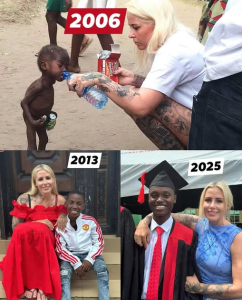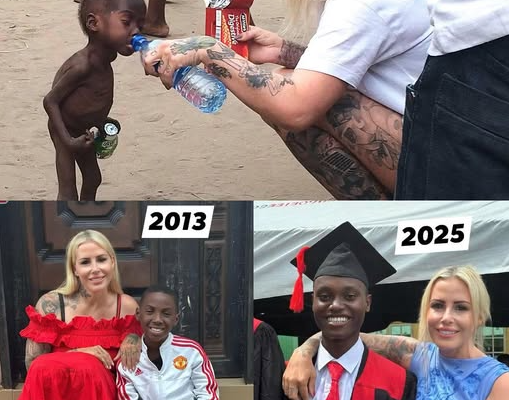A Miraculous Journey of Hope: From an Abandoned Child in Nigeria to a University Graduate
In the early hours of a humid morning in southern Nigeria, a newborn baby lay wrapped in a thin piece of cloth beside a dusty roadside. There was no name written, no note explaining why the child had been left behind—only silence and uncertainty. For many, this would have been the end of the story. But for this child, it was the beginning of a miraculous journey defined not by abandonment, but by resilience, compassion, and an unbreakable hope for a better future.
The baby was discovered by a local woman on her way to the market. Hearing faint cries, she followed the sound and found the infant trembling and hungry. Without hesitation, she picked the child up and carried them to the nearest community clinic. News of the abandoned baby spread quickly through the village, stirring sadness, anger, and questions no one could answer. Yet amid the heartbreak, something powerful emerged: a collective decision that this child would not be forgotten.
With limited resources and overcrowded facilities, the clinic contacted a small local orphanage already struggling to care for dozens of children. Still, they made space. The baby was given a name that meant hope in the local language—a word that would quietly guide every step of the years to come.
Life in the orphanage was far from easy. Meals were simple and sometimes scarce. Clothes were shared. Beds were crowded. Electricity was unreliable, and books were precious. But within those walls lived something stronger than hardship: love. Caregivers, though underpaid and exhausted, poured their hearts into the children. They taught them to read, to pray, to believe that their lives mattered.
As the child grew, curiosity became their defining trait. While others played, they asked questions. Why is the sky blue? How does a radio work? What makes a car move? The caregivers noticed this hunger for knowledge and encouraged it, even when resources were thin. Old textbooks were donated. A broken computer was repaired piece by piece. Education became both an escape and a dream.
School, however, brought new challenges. The child faced stigma—whispers about being “from the orphanage,” questions about parents, subtle reminders of being different. Some days were painful. Some nights were filled with tears. But each setback only strengthened their resolve. They learned early that their past did not define their future.
One teacher, recognizing the child’s potential, became a turning point. She stayed after class, offered extra lessons, and spoke words that changed everything: “Your beginning was not your choice, but your ending will be.” Those words took root. They became fuel during moments of doubt.
As secondary school approached, financial barriers threatened to end the journey. School fees were high, uniforms expensive, exam costs overwhelming. Once again, hope arrived through unexpected kindness. A local nonprofit organization, focused on supporting vulnerable children, learned of the student’s academic excellence and stepped in with a scholarship. For the first time, university no longer felt impossible—it felt close.
Years passed in a blur of studying, working small jobs, and pushing forward against every obstacle. The student chose a field of study not just to earn a living, but to give back—education, social work, engineering, health sciences—fields rooted in service and change. University life was overwhelming at first. Large lecture halls, advanced coursework, and students from privileged backgrounds made feelings of inadequacy resurface. But perseverance had become second nature.
There were moments when quitting seemed easier. When money ran short. When loneliness felt heavy. When the weight of expectations became too much. Yet each time, the memory of that roadside, the orphanage, the teachers, and the countless hands that had lifted them up served as a reminder: giving up was not an option.
Graduation day arrived quietly—but its meaning was thunderous.
Dressed in a borrowed gown, standing among hundreds of graduates, the once-abandoned child listened as their name was called. Applause filled the hall. In that moment, the journey came full circle. From abandonment to achievement. From invisibility to recognition. From survival to purpose.
Tears flowed freely—not just from the graduate, but from caregivers, teachers, and supporters who had walked the journey from afar. This degree was not just a certificate; it was proof that circumstances do not have the final word.
Today, the graduate stands not as a symbol of pity, but as a testament to possibility. They mentor children from similar backgrounds, advocate for education, and remind others that hope is not naïve—it is powerful. Their story echoes across communities, challenging assumptions about poverty, abandonment, and destiny.
This is not just one person’s success story. It is a reminder of what happens when compassion meets opportunity. When society chooses not to look away. When one abandoned child is given a chance—and takes it.
From a dusty roadside in Nigeria to a university graduation stage, this miraculous journey of hope proves a timeless truth: no matter how broken the beginning, the future can still be beautifully rewritten


